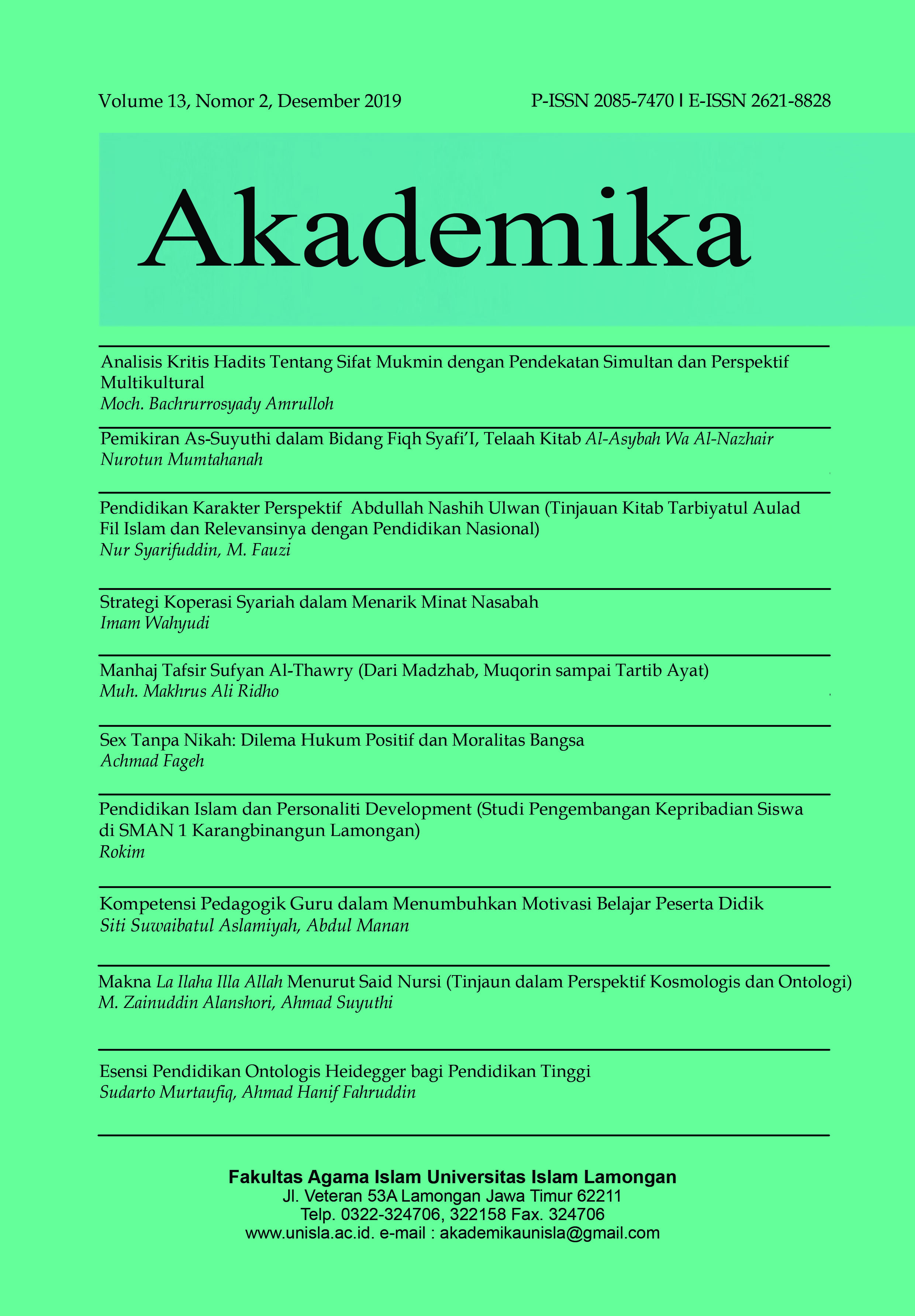SEX TANPA NIKAH: Dilema Hukum Positif dan Moralitas Bangsa
DOI:
https://doi.org/10.30736/adk.v13i02.127Keywords:
Free sec, positive law, national moralityAbstract
Efforts to bring together the synergity of positive legal products and the value of morality of the nation as the wisdom of local cultures to-Indonesiaan needs the seriousness of various parties. Specifically, the provisions of the law governing adultery that truly reflect the aspirations and values that live in the community and are moral mirroring, are indispensable to the attention of many other aspects that Need to also note. While awaiting its realization, the author considers it to be no longer the time when all parties excuse that the freedom and privacy of a person in the sex field is ' closed ' to the law, so that the criminal law stops at the front door of the room. Therefore, maintaining the notion of adultery according to the PENAL code (which is now in force), is the same by validating the sofsion of the values of goodness that live in society. Do we have to be flashed and want to keep that detrimental ' privacy '? Do we still have to ' endure ' by skipping.The formulation of TP fornication in the RUU KUHP has a wider scope than arranged in the KUHP. This is reflected in article 417 and article 419 RUU KUHP, which arranges about the deed of intercourse with a person who is not a husband or his or his/her "collect Kebo" act. Controversy appear as the Delik fornication arranged in both of the article is a complaints delics (still equal to the Delik fornication in article 284 KUHP). The fornication act is not changed to a common delics that can be reported by anyone who knows the deeds. From the subject side, the right to complain has been expanded in a RUU KUHP, which can be complained by a husband, wife, parent, or child.
Downloads
References
Abdalla, Faisal. “Komisi III Optimis RKUHP Rampung di Periode Iniâ€, https://www.medcom.id/ nasional/politik/GbmXP93Nkomisi-iii-optimis-rkuhprampung-di-periode-ini, diakses 5 September 2019. Cornil, Paul. 1971.
al-Maududi, Abu A‘la, Hak Asasi Manusia dalam Islam, Jakarta: Yapi, 1998.
Baiquni, Islam dan Ilmu Pengetahuan Modern, Bandung; Mizan Pustaka, 1983.
Carl P. Simon and Ann D. Witte: Beating the System: The Underground Economy, Dover, MD: Aubom House, 1982.
Criminality and Deviance in a Changing World, Part Three. Summaries Of LecturesFourth United Nations Congress OnThe Prevention Of Crime and The Treatment Of Offenders, Kyoto, Japan, 17-26 August 1970, Department of Economic and Social Affairs: Report prepared by the Secretariat, New York: United Nation
Detiknews, “Mengapa Nikah Siri Tidak Masuk Hukum Pidana?â€, https://news.detik.com/ berita/d-2202086/mengapanikah-siri-tidak-masuk-hukumpidana, diakses 5 September 2019
Eksodiputro, Mardjono R, Pembaharuan Hukum Pidana; Kumpulan Karangan Bukukeempat, Jakarta: Pusat Pelayanan Keadilan dan Pengabdian Hukum Univ. Indonesia, 1994.
Erdianto, Kristian. "Rancangan KUHP, Nikah Siri dan Poligami Bisa Dipidana", https:// nasional.kompas.com/ read/2018/02/01/09494181/ rancangan-kuhp-nikah-siri-danpoligami-bisa-dipidana, diakses 4 September 2019
Ghazali dkk, Filsafat Ilmu. Yogyakarta: Pokja Akademik UIN Sunan Kalijaga.., 2005.
Golshani, Melacak Jejak Tuhan dalam Sains: Tafsir Islami atas Sains, Bandung: MizanPustaka. 2004.
Hamzah, Andi. KUHP dan KUHAP, (Rineka Cipta, Jakarta,2011),
--------, Pomografi Dalam Hukum pidana; SutJtu Stud;suatu studi perbandingan, Jakarta: Bina. Mulia, 1987.
Hisyam, Abdul Malik bin. Abu Muḥammad, as-Sīrat an-Nabawyyah, juz 2, ttp., tp., tt.
J. Chr. Purwawidyana: Etika Biomedis: Pengguguran, suatu Kasus Etika , dalam Budi Susanto, et.al.(ed.): Nilai -nilai Etis dan Kekuasan Utopis, Yogyakarta: Kanisius, 1992.
John H. Lindquist: Misdemeanor Crime: Trivial Criminal Pursuit, Newbury Park: Sage Publication, 1988.
Mahzar, Armahedi. Revolusi Integralisme Islam: Merumuskan Paradigma Sains dan Teknologi Islami, Bandung: Mizan Pustaka, 2004.
Mulia, Siti Musdah, Membangun Surga di Bumi: Kiat-Kiat Membina Keluarga Ideal dalam Islam, Jakarta: Elex Media Komputindo, 2011.
R. Soesilo: Kitab Undang-undang Hukum Pidana (KUHP)serta komentar, Bogor: Politcil. 1983.
Santoso, Topo. Masalah Delik Perzinaan di Indonesia Dewasaini;, dalam Majalah Hukum dan Pembangunan No.2 Th. XXV April 1995, Jakarta: FHUI, 1995.
Seno Adji, Oemar. Herzening. Ganli Rugi, Suap, perkembangan delik, Jakarta: Erlangg., 1981.
--------, Hukum (Acara) Pidana Dalam Prospektif, Jakarta: Erlangga, 1984.
--------, Hukum pidana pengembangan, Jakarta: Erlangga., 1985.
Shihab Quraish, M. Membumikan Al-Qur’an: Fungsi dan Peran Wahyu dalam Kehidupan Masyarakat, Bandung: Mizan Pustaka, 1999.
Syarifin, Pipin, Hukum Pidana Di Indonesia, CV Pustaka Setia, Bandung, 2000.
Undang-Undang Republik Indonesia Nomor 39 Tahun 1999 Pasal 1 tentang Hak Asasi Manusia.
Wardi Muslich, Ahmad. Hukum Pidana Islam, Sinar Grafika, Jakarta, 2005.
Ziba Mir-Hosseini and Vanja Hamzić, Control and Sexuality The Revival of Zina Laws in Muslim Contexts, London: Women Living Under Muslim Laws, 2010.














